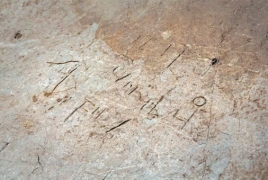1,300-year-old inscriptions found at ‘King Arthur’s birthplace’ June 15, 2018 - 14:36 AMT PanARMENIAN.Net - A 1,300-year-old windowsill covered in ancient writing has been discovered at what is generally believed to be the birthplace of King Arthur, The Sun says. Alongside other recent finds at Tintagel Castle in north Cornwall, it suggests the site could have been an important royal base with links stretching as far as the eastern Mediterranean. The stone, believed to be part of a medieval window ledge features Latin writing, Greek letters and Christian symbols all date from the seventh century AD. It is thought to have been the work of someone practising writing. Inscribed writing from the early Middle Ages rarely survives, so the find of the 1,300 year old engraving is particularly unusual, according to English Heritage, which manages the site on the north Cornwall coast. It was uncovered last summer as part of a major excavation at Tintagel by Cornwall Archaeological Unit, which has also turned up oyster shells and livestock bones, bowls from Turkey and glass goblets from Spain dating from the same period. The stone, a two-foot long piece of Cornish slate which served as a window ledge in a building that appears to have been part of a major early medieval settlement, includes Roman and Celtic names "Tito" or Titus, and "Budic". This hints at a multicultural community on the north Cornwall coast some 1,300 years ago, the experts said. The Latin words "fili" or son, and "viri duo", which means two men, also appear on the stone. Further analysis will be conducted on the stone to see how it was engraved, and meanwhile it is going on display at Tintagel from Saturday. While Tintagel is intricately bound up in the legend of King Arthur, who is said to have been conceived there in the late fifth century, experts think it was the seat of early Cornish kings with trading links to the Mediterranean during "Cornwall's First Golden Age". It adds further weight to the theory of early medieval Tintagel as a royal site with a literate Christian culture and a network of connections stretching from Atlantic Europe to the eastern Mediterranean, English Heritage said. Curator Win Scutt said: "It's incredible to think that 1,300 years ago, on this dramatic Cornish cliff-top, someone was practising their writing, using Latin phrases and Christian symbols. "We can't know for sure who made these marks or why, but what we can say is that seventh century Tintagel had professional scribes who were familiar with the techniques of writing manuscripts and that in itself is very exciting. "Our ongoing research has already revealed the extent of Tintagel's buildings and the richness of the lifestyle enjoyed here. "This latest find goes one step further to show that we have a literate, Christian community, with strong connections from Atlantic Europe to the Mediterranean." Azerbaijani authorities report that they have already resettled 3,000 people in the Nagorno-Karabakh town of Stepanakert. On June 10, Azerbaijani President of Azerbaijan Ilham Aliyev will leave for Turkey on a working visit. Azerbaijani President Ilham Aliyev arrived in Moscow on April 22 to hold talks with Russian counterpart Vladimir Putin. Authorities said a total of 192 Azerbaijani troops were killed and 511 were wounded during Azerbaijan’s offensive. Partner news |